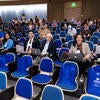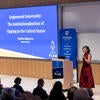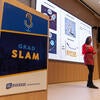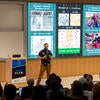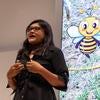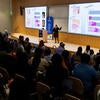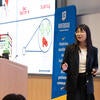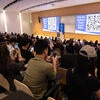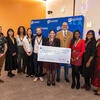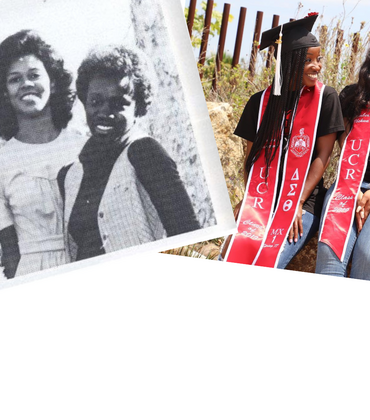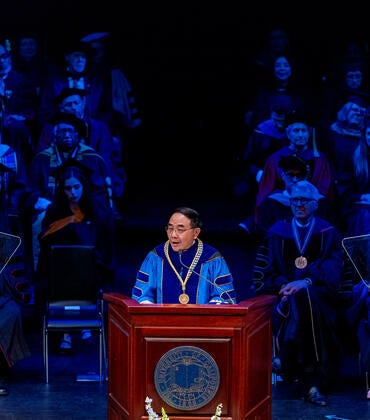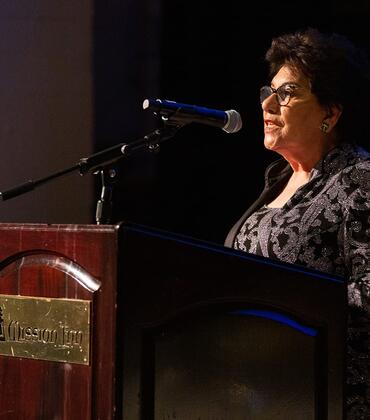
On April 11, nine UC Riverside graduate students presented their research at the 11th annual UCR Grad Slam Final for a chance at $5,000. The event was hosted by UCR’s Grad Division and was held on campus at the School of Business.
Grad Slam is a University of California-wide speaking competition in which graduate students get three minutes to describe their research to judges and an audience of peers, faculty, staff, friends, and family.
UCR’s leg of the competition started with participants from each school/college, who were whittled down to 20 semi-finalists, and then to nine finalists. Competitors were judged on how well they engaged the audience, how clearly they communicated key concepts, and how effectively they presented their ideas.
Vice Provost and Dean of Graduate Studies Lidia Kos acted as emcee, welcoming the crowd of about 150 in-person attendees and 200 online streamers. Kos thanked her staff and the six judges for their support. Judges included representatives of the City of Riverside, UC alumni and faculty, and regional reporter Rob McMillan.
One major difference this year was that presenters were only allowed one static slide, compared to the animated features included in previous years. The slides varied from a simple tip percentage screen to a 400-year-old manuscript. One slide included a cartoon bee, while another included cartoon boxers. Presenters took turns describing the significance of their research. Why Americans feel obligated to tip for basic services. How a Black mother’s stress leads to her child’s mortality. Or how beehive health affects our daily cup of coffee.
When the pitches were done, a QR code appeared on the screens, and both the in-person and streaming crowds were asked to vote for the "audience choice.” People were then released to the lobby for snacks/refreshments and music provided by the Office of Sustainability, while the judges’ scores were tallied.
Event sponsor and elected member of UCR’s Board of Trustees Sam Konyn announced the winners:
- Audience Choice: Chujing Zheng for “Microbial Showdown: Superbugs vs. Good Bacteria”
- 3rd Place: Nico Valdivia Hennig for “Weaving Decolonial Narratives: Research-Creation through Ink, Weave, and Pixels”
- 2nd Place: Justin Huft for “Racial Verification and Far-Right Support Among Whites”
“I was honored to be a part of Grad Slam this year,” Konyn said. “Grad Slam is one of several events exposing the myriad of research at UCR to the public. I thank all the participants for investing their time to share their work.”
The grand prize winner was announced last — Angeliz Vargas Casillas for “Multiscale Modeling of Keloid Scar Expansion.” Casillas was handed the giant check and reminded that she would have to do this all over again on April 29, when she will pitch at the UC Grad Slam Finale.
The event will take place at the UC Student and Policy Center in Sacramento and will be hosted by UC President Michael V. Drake, M.D. The finale brings together winners from the other nine UC campuses for one epic battle for $7,000. Tune in to YouTube on April 29 to watch a live stream of the 2025 UC Grad Slam Finale. To follow social media coverage, check out #ucrgradslam and #gradslam2025.
Learn more about UCR’s nine 2025 Grad Slam finalists and their research:
Karina Alpayeva | CHASS | Political Sciences | Class of 2028
Engineered Generosity: The Institutionalization of Tipping in the United States
"My research project examines the historical origins and contemporary consequences of tipping practices in the United States. I investigate how tipping became institutionalized as a wage system and how it reinforces social hierarchies and economic inequalities. Drawing on insights from comparative political economy, I analyze why the U.S. retains tipping while other countries have moved away from it. Ultimately, the project aims to understand how everyday economic interactions reflect and reproduce broader power structures.”
Sushmitha Arumugam | CNAS | Neuroscience | Class of 2026
Gravity: The Silent Ruler of Movement and Energy
“We know gravity governs the escape of rockets, the movement of stars, and even keeps our feet on the ground— but how does it affect humans and other animals, especially when it comes to how they move and use energy? My research explores this question by studying fruit flies under hypergravity conditions, where gravity is several times stronger than normal. By observing how their movement changes and investigating the brain circuits involved, we’re uncovering how animals adapt to extreme environments. These findings could offer insights into how different species — including humans — adjust to altered gravity, like in space or on other planets.”
Angeliz Vargas Casillas | CNAS | Mathematics
Multiscale Modeling of Keloid Scar Expansion
“Keloid scars are wounds that do not heal properly and result in a tumor-like overgrowth on the skin that continues to grow past the initial injury region. They are only found in human skin and attempts to surgically remove them only worsen the scars when they grow back. To understand the cell interactions that lead to keloid scar expansion without further injuring patients, I created a computer-based mathematical model. Using this model, I predict the cell signaling that leads to keloid expansion. Now, our biology collaborators can test these predictions and suggest potential keloid treatments.”
Nico Valdivia Hennig| CHASS | Spanish | Class of 2026
Weaving Decolonial Narratives: Research-Creation through Ink, Weave, and Pixels
“My research explores how Indigenous communities across Latin America are creating digital games to reclaim cultural narratives and resist colonial legacies. Through interviews, case studies, and my own game development practice, I examine how games can become tools of empowerment, environmental justice, and cultural preservation. By centering Indigenous voices, I aim to show that game design is not just entertainment— it’s also political, pedagogical, and deeply relational.”
Justin Huft | CHASS | Sociology | Class of 2027
Racial Verification and Far-Right Support Among Whites
“My work explores the relationship between identity — particularly racial identity — and far-right attitudes. I present QAnon as a case study, finding that people are more drawn to replacement realities when they feel their identities are not being seen accurately by others. Ultimately, I identify several upstream factors that buffer against QAnon support.”
Mst Shamima Hossain | BCOE | Computer Science | Class of 2026
Electronic Bee-Veterinarian: An Automated Beekeeping Assistant
“Honeybee colonies are responsible for pollinating one-third of our food. Yet, they are disappearing at an alarming rate — a devastating 62% colony loss nationwide just last year. Transforming traditional beekeeping practices with our automated, remote-sensing beekeeping assistant equipped with plug-in sensors, Electronic Bee-Veterinarian can be the solution. As a computer science Ph.D. student, I am collaborating with entomologists to develop this system.”
Yili Lam | SOM | Biomedical Sciences
Brain Cell Survival: Resisting a Range of Ways to Die
“I study how neurons die in order to understand what factors matter in promoting neuron survival. We need to fundamentally understand how different types of cell death pathways work and are interconnected before we can identify what matters in treating neurodegenerative disease.”
Hermona Yared | SPP | Public Policy
Systemic Racism and Black Maternal Health: The Impact of the Criminal Legal System
“My work examines how systemic racism within the criminal legal system affects racial disparities in maternal morbidity and mortality. Black women have the highest risk of preterm birth and pregnancy-related mortality in the United States. This literature review examines the current state of the literature on the connections between mass incarceration, chronic stress, and racial disparities in maternal health to understand the role of the criminal legal system in Black maternal health outcomes.”
Chujing Zheng | BCOE | Chemical and Environmental Engineering | Class of 2026
Microbial Showdown: Superbugs vs. Good Bacteria
“Antibiotic overuse creates ‘superbugs’ that are hard to kill — but what if our best defense isn’t stronger drugs, but the good bacteria already living in our gut? I mimic the messy, stressful conditions inside the human body to see how the microbial battle really plays out. I found that good bacteria often outcompete superbugs, especially under tough conditions. This could change how we fight antibiotic resistance — by working with our microbes, not just against the bad ones.”

